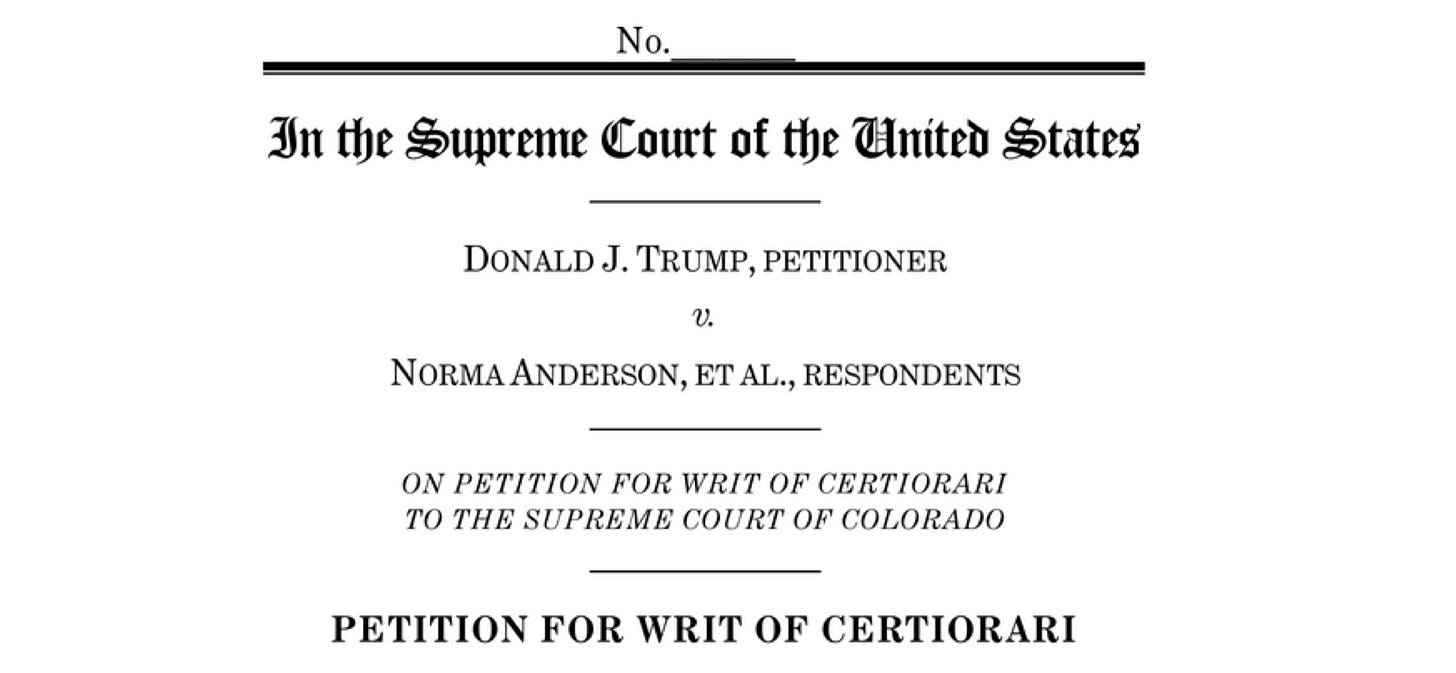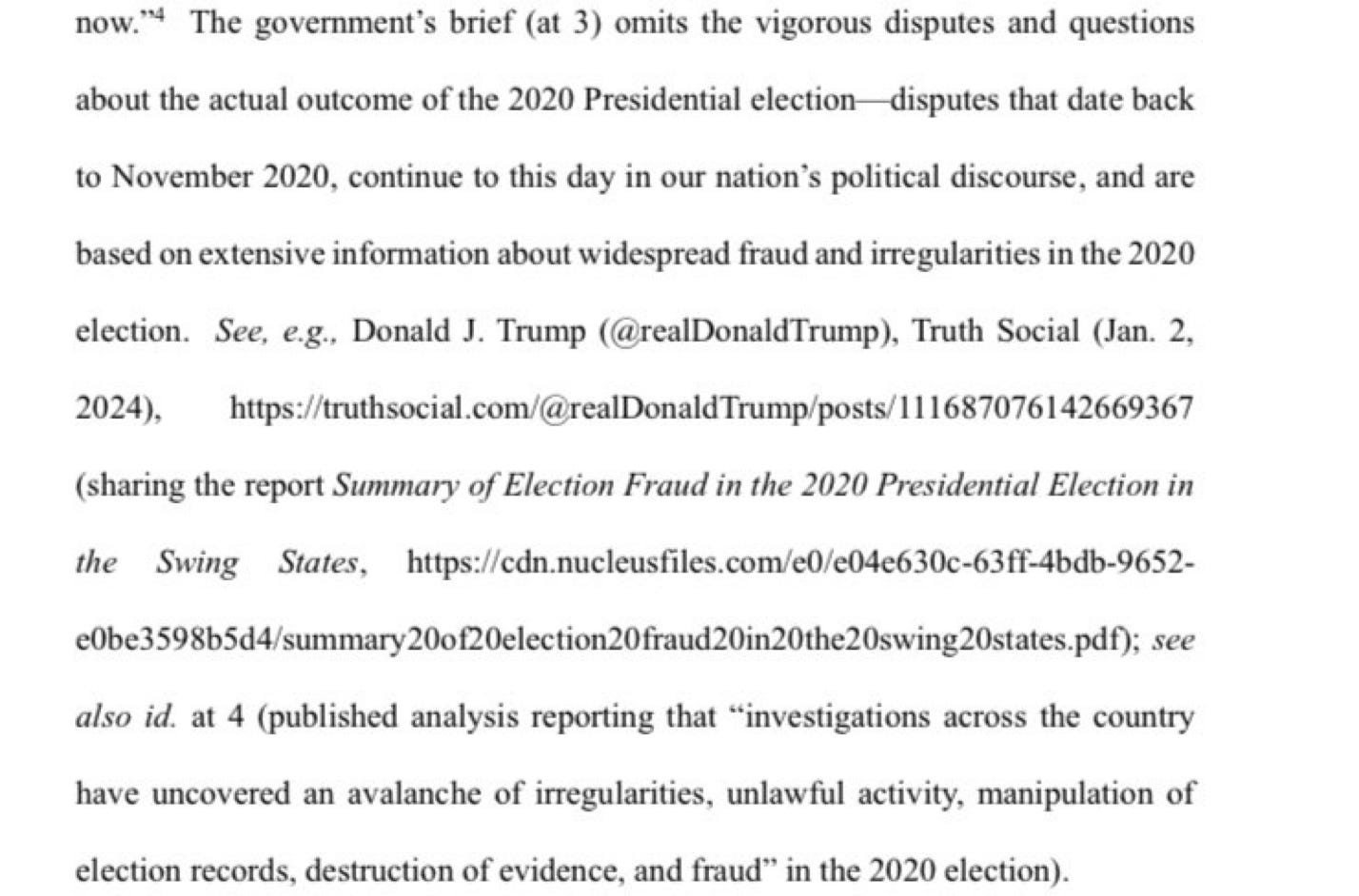An Overview: The Trump Cases
E. Jean Carroll’s defamation case, Trump’s immunity claim, and the Colorado Supreme Court’s ballot ban
With court now in session after the new year, Trump’s legal pressures are mounting. And there are some interesting developments, so it’s a good day for a recap of where things stand.
I’m looking at three major stories in Trump legal land:
The E. Jean Carroll defamation trial, set to begin mid-January;
The appeal from Judge Chutkan’s denial of Trump’s criminal immunity claim in the D.C. case; and
Trump’s petition before SCOTUS seeking review of the Colorado Supreme Court rulings striking him from the state’s primary ballot.
There are a great many details, so I’m going to focus on just a few key ones to keep in mind.
The E. Jean Carroll trial
If you’re like many people, you might have assumed the E. Jean Carroll trial was done. Wasn’t Trump found by a jury back in May of committing sexual abuse against Carroll?
Yes, he sure was. But there are actually two parallel cases here, one for defamation and one for the assault itself.
Carroll had originally sued Trump for defamation back in 2019, while he was still president, for denying her allegation that he had raped her in a department store dressing room. At the time, she couldn’t sue for sexual assault because the statute of limitations had run, so she did the next best thing and sued to get her good name back.
Then New York changed its laws around adult survivors of sexual abuse, allowing Carroll to bring her claim despite it being time barred under the old laws. That’s the case the jury heard and delivered a $5 million verdict on in May 2023.
The defamation trial had been on hold pending complicated appellate reviews, but a lot of that got resolved when the Second Circuit issued its ruling in December 2023 that Trump had raised his defense of civil immunity too late and that it was now time barred. (There is a certain poetic justice to that.)
There’s another interesting parallel here, too. Remember when a judge held that Rudy Giuliani had defamed the election workers, Ruby Freeman and Shae Moss, and that the only issue was how much he owed them in damages? That happened here as well. A judge has already found for E. Jean Carroll on the question of liability, so the only issue remaining is how much Trump has to pay her.
Trump has been trying to delay that damages-only trial, which is set to begin January 16. But on Wednesday, he got two bad pieces of news. First, the Second Circuit denied his petition for the entire circuit to hear the case, or what’s called en banc review. Second, it denied his request to put the trial on hold pending his appeal.
That second part probably stings the most. As we’ve seen in the D.C. case, which I’ll discuss below, Trump keeps hoping that endless appeals will keep the trials from moving forward, and then that the election will make it impractical for them to be held at all. He will now ask the Supreme Court to step in to stay the damages trial pending his appeal. But my guess is that they will not weigh in.
Criminal immunity appeal
If there’s a recurring theme to Trump and his filings, it is this: He claims he is above the law, simply because he was president before. Trump argues, for example, he cannot be sued by Carroll because, as a former president, he has civil immunity from liability. By the way, that’s the same argument he recently lost before the D.C. Circuit, where a group of police officers are suing him for injuries sustained on January 6.
Of current concern is Trump’s broad claim of immunity from criminal prosecution. Specifically, Trump argues that his actions while president not only protect him from being sued in civil court, but also protect him from being charged by prosecutors. It’s a wild and unsupportable theory, but he’s made it nonetheless. It’s hard to see how Trump could fail to have immunity from civil suits but nonetheless escape criminal accountability for those same actions.
This underscores a key point. Trump is throwing Hail Mary immunity arguments for one reason: to delay his trial. If the Supreme Court sits on a decision over immunity for too long, Trump could run out the clock before the election.
Three things I have picked up in the legal chatter around this.
The first is somewhat atmospheric, but it gives a rare glimpse into Trump’s intended legal defense. As Politico’s senior legal affairs reporter Kyle Cheney noted, in Trump’s final papers before the D.C. Circuit on the question of presidential immunity—a matter being heard in just five days—Trump cites not once but twice to an “anonymously authored compendium of voter fraud claims (many, if not all, of which have been debunked) that Trump posted on social media earlier today.”
That’s right: Trump is apparently citing to … his own Truth Social post. That’s not evidence, and neither is the so-called report, “Summary of Election Fraud in the 2020 Presidential Election in the Swing States.” It will be interesting to see what judges do with this kind of self-referential, non-expert and roundly debunked “report.”
I can only imagine his legal team trying to explain to him that this citation is improper and not admissible evidence, and him insisting that they put it in anyway.
Second, Trump insists that the indictment concerns actions by “official staff and public officials” in an attempt to buttress the notion that Trump was acting within some kind of official capacity when he conspired to overturn the election results.
But as Kyle Cheney points out, five out of six of the people identified as his co-conspirators (to wit, Giuliani, Eastman, Powell, Chesebro and presumably Epshteyn) were private actors, some with their own network of private actors. Even co-conspirator Jeffrey Clark, who was an “official” with the Justice Department, was an environmental lawyer, not an elections investigator. He was acting outside of his official capacity.
Third, and perhaps most consequentially, the nonprofit group American Oversight has filed an amicus brief which raises a fascinating and new legal argument. It’s one that could actually undo all of Trump’s plans to tie up the case with the Supreme Court.
The issue involves exactly when a defense like “absolute presidential immunity” can earn a right to an immediate appeal—what’s called by lawyers an “interlocutory appeal”—and thereby stops the case from moving forward. As L.A. Times legal analyst Harry Litman observed, American Oversight’s brief could be a game changer. It points out that the Supreme Court has
emphasized that in criminal cases, the compelling interest in prompt trials demands that courts apply the interlocutory appeal doctrine “with utmost strictness.” Federal courts have jurisdiction over such appeals, the justices found, only if they are brought under a constitutional or statutory provision that expressly gives the defendant a right not to go to trial.
The brief cites a unanimous opinion, written by the late Justice Scalia, that limits such appeals to three types of motions: motions to reduce bail, motions concerning the double jeopardy clause in the Constitution, and motions under the Speech or Debate Clause, which protects legislators from being tried or questioned.
Trump’s motion doesn’t fall into any of these categories. So if the D.C. Court of Appeal really wanted to stick it to Trump, it could rule that his motion is improper in the first place as an “interlocutory appeal” and send the case back to Judge Chutkan with orders to restart the proceedings. (It could also rule, for completeness, that he lacks absolute presidential immunity anyway.)
It will be very interesting to see what the D.C. Circuit does in light of this fairly clean and compelling case—one that really messes with Trump’s whole strategy of delay, delay, delay.
The Colorado Supreme Court case under Section 3
While Trump seems in no hurry to move the D.C. case forward, he has sought quick resolution of the Colorado matter which threatens to keep him off the ballot there.
Trump makes arguments that the GOP respondents in Colorado did not raise in their petition, two of which are a bit interesting to me.
First, Trump argues that Section 3 of the 14th Amendment is only a bar to holding office, not a bar to appearing on the ballot and being elected to that office. He claims that Section 3 allows Congress to undo the disqualification by a two-thirds vote, meaning it’s possible that someone who is adjudged to be an insurrectionist could in theory still be elected and then permitted to serve due to an overriding vote by Congress.
This theory is a bit too cute by half, I believe, because Congress could also vote before the election to allow an insurrectionist to appear on the ballot if it really wanted to. There is nothing saying it can’t, so if there’s any real chance of this happening (which there isn’t), the question of when Congress could remove the disqualification is immaterial to whether an insurrectionist can stand for federal office.
Nevertheless, it’s the kind of “out there” argument that the conservatives on the Supreme Court could use to justify a ruling in his favor. (And there are no shortages of such justifications.)
Second, Trump argues that he is not an insurrectionist under the legal meaning of the term and that his speech at the Ellipse is protected as a matter of law under the First Amendment. Trump’s lawyers must understand on some level that this is a loser argument, as they didn’t raise it until very late in the brief. Incitement of insurrection is a very fact-based inquiry and depends on evidence that is best left to the finder of fact, in this case the judge in the Colorado district court after a five-day bench trial. Those findings normally would only be disturbed if they were unsupported by substantial evidence or there was a legal infirmity to them.
The Supreme Court is likely quite interested, for the sake of the country, to weigh in and resolve this matter before more states begin to strike Trump from the ballot. If Section 3 is no bar to his candidacy, the justices should say that now before the legal landscape erodes further on this question.
The above cases are all likely to move toward some kind of resolution during the month of January. The first real test will be if/when the Supreme Court grants review of the Colorado case, followed by the D.C. Court of Appeals hearing on Trump’s claims of presidential immunity.
I’ll be keeping a close eye on both.







Trump has cherry picked words and phrases from E. Jean Carroll’s publications and interviews. He’s running a vile text on Truth Social. I hope her brilliant attorney and the judge in her upcoming case will use his tirade to up her settlement.
Jay, can you please explain why it is OK for the lawyers to include falsehoods in their filings? (e.g., "widespread disputes over the election outcome" that were shot down about 61 out of 62 times in courts)